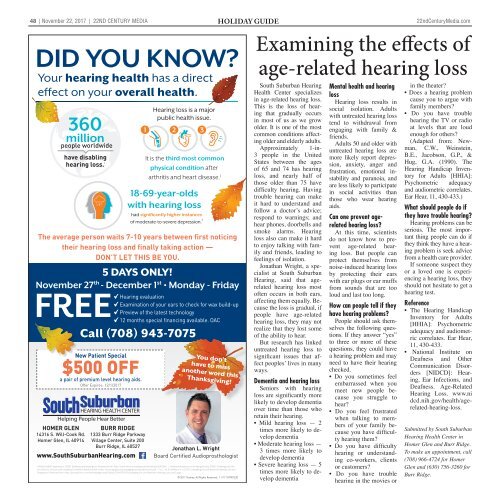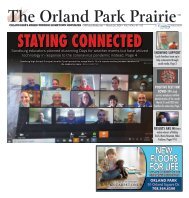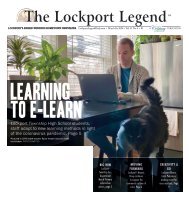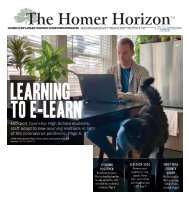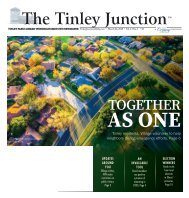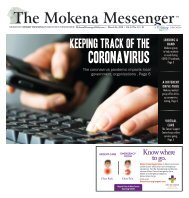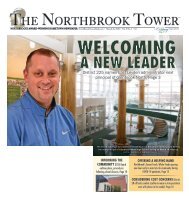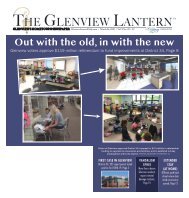Create successful ePaper yourself
Turn your PDF publications into a flip-book with our unique Google optimized e-Paper software.
48 | November 22, 2017 | 22nd century media holiday guide<br />
22ndCenturyMedia.com<br />
DID YOUKNOW?<br />
Your hearing health has adirect<br />
effectonyour overall health.<br />
360<br />
million<br />
peopleworldwide<br />
havedisabling<br />
hearing loss. 1<br />
The average person waits7-10 yearsbetween first noticing<br />
their hearing loss and finallytaking action —<br />
DON’T LET THIS BE YOU.<br />
5DAYSONLY!<br />
November 27 th -December 1 st •Monday-Friday<br />
FREE<br />
12<br />
New Patient Special<br />
$500 OFF<br />
apair of premium level hearing aids.<br />
Offer Expires: 12/1/2017<br />
HOMER GLEN<br />
14316 S. Will-Cook Rd.<br />
Homer Glen, IL 60914<br />
www.SouthSuburbanHearing.com<br />
Hearing loss is amajor<br />
public health issue.<br />
1 2 3<br />
It is the third most common<br />
physical condition after<br />
arthritis and heartdisease. 2<br />
18-69-year-olds<br />
with hearing loss<br />
had significantly higher instances<br />
of moderate-to-severe depression. 3<br />
Hearing evaluation<br />
Examination of your earstocheck forwax build-up<br />
Previewofthe latesttechnology<br />
months special financing available. OAC<br />
Call (708) 943-7075<br />
HEARING HEALTH CENTER<br />
Helping People Hear Better<br />
BURR RIDGE<br />
1333 Burr Ridge Parkway<br />
Village Center,Suite200<br />
Burr Ridge, IL 60527<br />
You don’t<br />
have to miss<br />
another word this<br />
Thanksgiving!<br />
Jonathan L. Wright<br />
Board Certified Audioprosthologist<br />
1World Health Organization. (2015). Deafness and hearing loss. Retrievedfrom: http://www.who.int/mediacentre/factsheets/fs300/en/ |2National AcademyonanAging Society.(1999). Challenges for the<br />
21st Century: Chronic and Disabling Conditions. Retrievedfrom: http://www.agingsociety.org/agingsociety/pdf/chronic.pdf |3Li, C. M. &Hoffman, H. J. (2014). Untangling the Link Between Hearing Loss and<br />
Depression. Retrievedfrom: http://journals.lww.com/thehearingjournal/Fulltext/2014/07000/Untangling_the_Link_Between_Hearing_Loss_and.2.aspx<br />
©2017 Starkey. All Rights Reserved. 11/17 187981230<br />
Examining the effects of<br />
age-related hearing loss<br />
South Suburban Hearing<br />
Health Center specializes<br />
in age-related hearing loss.<br />
This is the loss of hearing<br />
that gradually occurs<br />
in most of us as we grow<br />
older. It is one of the most<br />
common conditions affecting<br />
older and elderly adults.<br />
Approximately 1-in-<br />
3 people in the United<br />
States between the ages<br />
of 65 and 74 has hearing<br />
loss, and nearly half of<br />
those older than 75 have<br />
difficulty hearing. Having<br />
trouble hearing can make<br />
it hard to understand and<br />
follow a doctor’s advice;<br />
respond to warnings; and<br />
hear phones, doorbells and<br />
smoke alarms. Hearing<br />
loss also can make it hard<br />
to enjoy talking with family<br />
and friends, leading to<br />
feelings of isolation.<br />
Jonathan Wright, a specialist<br />
at South Suburban<br />
Hearing, said that agerelated<br />
hearing loss most<br />
often occurs in both ears,<br />
affecting them equally. Because<br />
the loss is gradual, if<br />
people have age-related<br />
hearing loss, they may not<br />
realize that they lost some<br />
of the ability to hear.<br />
But research has linked<br />
untreated hearing loss to<br />
significant issues that affect<br />
peoples’ lives in many<br />
ways.<br />
Dementia and hearing loss<br />
Seniors with hearing<br />
loss are significantly more<br />
likely to develop dementia<br />
over time than those who<br />
retain their hearing.<br />
• Mild hearing loss — 2<br />
times more likely to develop<br />
dementia<br />
• Moderate hearing loss —<br />
3 times more likely to<br />
develop dementia<br />
• Severe hearing loss — 5<br />
times more likely to develop<br />
dementia<br />
Mental health and hearing<br />
loss<br />
Hearing loss results in<br />
social isolation. Adults<br />
with untreated hearing loss<br />
tend to withdrawal from<br />
engaging with family &<br />
friends.<br />
Adults 50 and older with<br />
untreated hearing loss are<br />
more likely report depression,<br />
anxiety, anger and<br />
frustration, emotional instability<br />
and paranoia, and<br />
are less likely to participate<br />
in social activities than<br />
those who wear hearing<br />
aids.<br />
Can one prevent agerelated<br />
hearing loss?<br />
At this time, scientists<br />
do not know how to prevent<br />
age-related hearing<br />
loss. But people can<br />
protect themselves from<br />
noise-induced hearing loss<br />
by protecting their ears<br />
with ear plugs or ear muffs<br />
from sounds that are too<br />
loud and last too long.<br />
How can people tell if they<br />
have hearing problems?<br />
People should ask themselves<br />
the following questions.<br />
If they answer “yes”<br />
to three or more of these<br />
questions, they could have<br />
a hearing problem and may<br />
need to have their hearing<br />
checked.<br />
• Do you sometimes feel<br />
embarrassed when you<br />
meet new people because<br />
you struggle to<br />
hear?<br />
• Do you feel frustrated<br />
when talking to members<br />
of your family because<br />
you have difficulty<br />
hearing them?<br />
• Do you have difficulty<br />
hearing or understanding<br />
co-workers, clients<br />
or customers?<br />
• Do you have trouble<br />
hearing in the movies or<br />
in the theater?<br />
• Does a hearing problem<br />
cause you to argue with<br />
family members?<br />
• Do you have trouble<br />
hearing the TV or radio<br />
at levels that are loud<br />
enough for others?<br />
(Adapted from: Newman,<br />
C.W., Weinstein,<br />
B.E., Jacobson, G.P., &<br />
Hug, G.A. (1990). The<br />
Hearing Handicap Inventory<br />
for Adults [HHIA]:<br />
Psychometric adequacy<br />
and audiometric correlates.<br />
Ear Hear, 11, 430-433.)<br />
What should people do if<br />
they have trouble hearing?<br />
Hearing problems can be<br />
serious. The most important<br />
thing people can do if<br />
they think they have a hearing<br />
problem is seek advice<br />
from a health care provider.<br />
If someone suspect they<br />
or a loved one is experiencing<br />
a hearing loss, they<br />
should not hesitate to get a<br />
hearing test.<br />
Reference<br />
• The Hearing Handicap<br />
Inventory for Adults<br />
[HHIA]: Psychometric<br />
adequacy and audiometric<br />
correlates. Ear Hear,<br />
11, 430-433.<br />
• National Institute on<br />
Deafness and Other<br />
Communication Disorders<br />
[NIDCD]: Hearing,<br />
Ear Infections, and<br />
Deafness. Age-Related<br />
Hearing Loss. www.ni<br />
dcd.nih.gov/health/agerelated-hearing-loss.<br />
Submitted by South Suburban<br />
Hearing Health Center in<br />
Homer Glen and Burr Ridge.<br />
To make an appointment, call<br />
(708) 966-4724 for Homer<br />
Glen and (630) 756-3260 for<br />
Burr Ridge.


